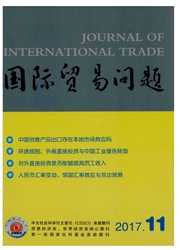

 中文摘要:
中文摘要:
依托服务贸易助推我国外贸发展方式转变的要义,不仅在于实现出口规模的扩张,更应注重出口技术复杂度的提升。考虑到服务业"全球化"和"碎片化"的特征,为了克服基于传统总值核算法所面临的固有缺陷,本文基于增加值视角利用WIOD数据库测算了2000—2014年我国服务出口技术复杂度,结果显示,从绝对角度看虽有不断提升之势,但从相对角度看却呈下降趋势。进一步的计量检验结果表明,融入全球服务业价值链对服务出口技术复杂度的绝对提升具有显著的正向作用,但对服务出口技术复杂度的相对提升在发达国家呈显著的正向作用,在发展中国家则呈显著的负向作用。此外,对诸如人力资本等具有显著的正向作用,而对诸如服务业发展规模等作用则在发达国家和发展中国家呈现显著的差异性。上述发现不仅有助于从"质"的层面客观认识我国服务出口,而且对于大力实施服务贸易发展战略也具有重要的政策意义。
 英文摘要:
英文摘要:
The essence of relying on services trade to boost China's foreign trade development model lies not only on export scale expansion, more attention should be paid to the increasing export sophistication. Considering the characteristics of "globalization" and "fragmentation" facts of service industry, in order to overcome the inherent defects of the traditional gross accounting method, based on the added value view, this paper estimates technical complexity of service export in China from 2000 to 2014 by using the WIOD database. The results show that, in spite of its continuous improvement of the situation from the absolute point, it has been on a downward trend from relative terms.Further econometric test results show that engaging in the global service industry value chain has a significant positive effect on the absolute improvement of services technology complex degree, but the relative improvement in technical complexity shows a significant positive role in developed countries and negative in developing countries. In addition, unlike the significant positive effect on human capital, the effect on factors such as the development of the service industry shows significant differences in developed countries and developing countries. These findings not only help us to understand China's service exports from the level of"quality",but also have important policy implications for vigorously implement the strategy of development of trade in services.
 同期刊论文项目
同期刊论文项目
 同项目期刊论文
同项目期刊论文
 期刊信息
期刊信息
